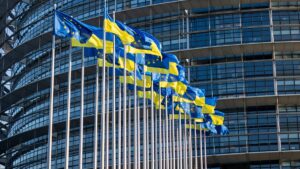
In July 2024, the international depository Euroclear will make the first contribution of approximately EUR1.55 billion to the European fund for Ukraine, according to the company’s report.
In the first half of 2024, Euroclear received EUR3.4 billion in interest income from investing blocked Russian assets.
In 2023, these revenues amounted to about EUR4.4 billion, in 2022 – EUR821 million.
Euroclear’s total interest income in January-June this year amounted to EUR4 billion.
The company will also pay taxes on income received from Russian assets in January-June in the amount of EUR836 million.
Thus, Euroclear’s net profit attributable to the frozen assets of the Central Bank of the Russian Federation amounted to EUR760 million in the first half of the year.
Euroclear’s balance sheet as of the end of June 2024 amounted to EUR207 billion, of which EUR173 billion are attributable to Russian assets under sanctions.
Effective February 15, 2024, the EU Council adopted a Regulation requiring central securities depositories that hold reserves and assets of the Bank of Russia to apply special rules to cash balances accumulated due to restrictive measures. These CSDs, including Euroclear, must account for and manage such extraordinary cash balances separately from other activities, must retain net income separately, and must not dispose of the net income (e.g., as dividends to shareholders).
Euroclear’s underlying net profit, which excludes income from the blocked Russian assets, increased by 7% year-on-year in January-June to EUR602 million.
Underlying operating income increased by 5% to EUR1.45 billion.
In particular, revenues from core activities amounted to EUR865 million compared to EUR838 million a year earlier, while interest, banking and other income increased to EUR586 million from EUR539 million.

The European Parliament has supported the creation of a EUR 50 billion Ukraine Fund for the period 2024-2027 to support Ukraine and implement reforms for the country’s future accession to the European Union.
The relevant resolution was adopted on Tuesday in Strasbourg as part of the European Parliament’s plenary session. “536 deputies voted in favor of the resolution, 40 voted against, and 39 abstained. A total of 615 deputies took part in the voting.
“The Fund should combine recovery, reconstruction and modernization with the requirements and process of accession to the Union, linking financial support to reforms and investments with a view to joining (the EU),” the document says.
The document was authored by representatives of the Foreign Affairs Committee Michael Gahler (Germany) and the Budget Committee Eider Gardiasabal Rubial (Spain).
The resolution stipulates that the EU will support Ukraine in three areas. The first is financial support for the country to implement reforms and investments, as well as to maintain its macro-financial stability. The second is to mobilize investment and increase Ukraine’s access to finance. The third is to help Ukraine on its path to European integration.
The approved decision stipulates that 33% of the resources for Ukraine will be allocated in the form of grants, “with at least 20% earmarked for the restoration, reconstruction and modernization of Ukraine’s subnational authorities, such as regions, cities and local communities.” In addition, 20% of the fund’s investments will be directed to green initiatives, and 15% to small and medium-sized enterprises.
The resolution calls for the Ukrainian government to develop a Plan for Ukraine. This plan, as noted in the document, will be “a coherent, comprehensive and adequately balanced recovery and modernization effort that supports Ukraine’s economic, social and environmental recovery, sustainable development and progress towards accession to the Union”, in line with the goals and requirements of the EUR 50 billion Ukraine Fund.
The Ukraine Plan is expected to provide a framework for other donors to identify priority areas for funding the country’s recovery.
The activities of the Ukraine Fund are to be evaluated annually by the European Commission.
“For effective monitoring, Ukraine should report once a year on the progress of the implementation of measures. Such reports prepared by the government should be appropriately reflected in the Ukraine Plan. Relevant reporting requirements should be applied to the recipients of Union funding,” the resolution says.
The EP resolution also calls for the development of ways to “utilize frozen Russian assets.
The text emphasizes “the importance of working with international allies to achieve this goal.” “This includes ensuring progress on how to use frozen Russian assets to help rebuild Ukraine,” the document says.
The approval of the Fund for Ukraine by the European Parliament now paves the way for the EU Council to adopt an official regulation, which will enter into force after publication in the EU’s Official Journal.
Earlier, the European Commission’s proposal to establish the Ukraine Fund was approved by the EU Council at an extraordinary meeting on February 1, as Hungarian Prime Minister Viktor Orban blocked the decision at a scheduled meeting held last December.